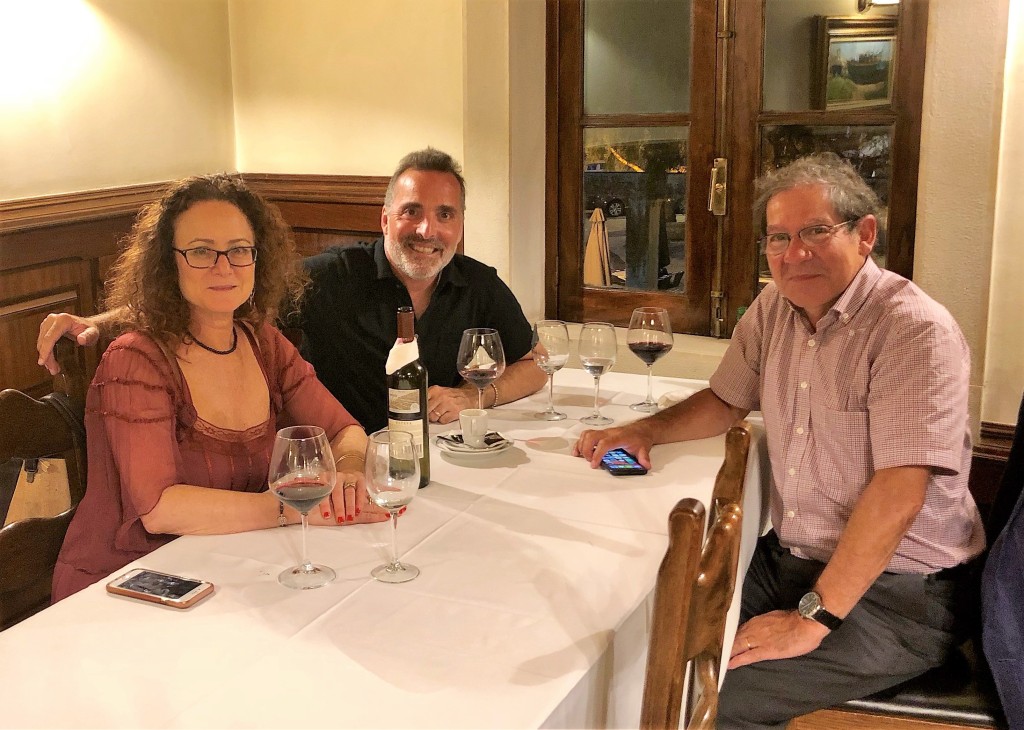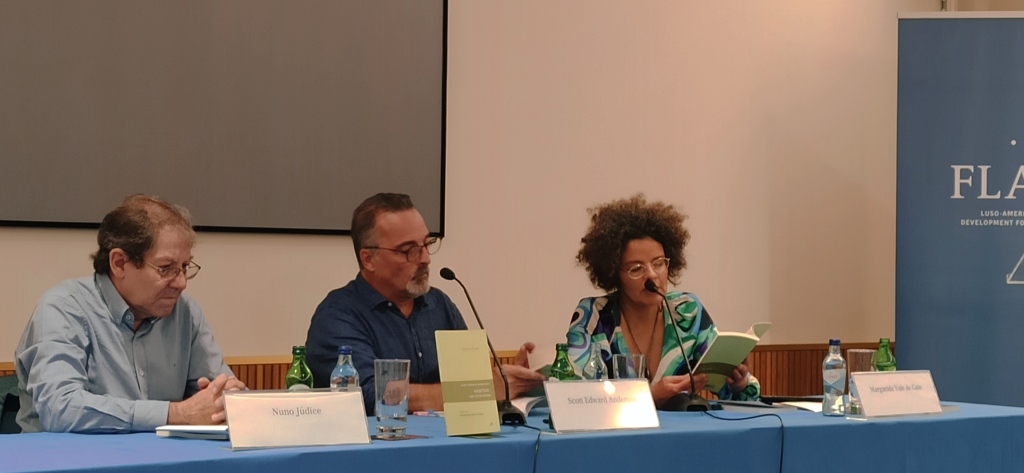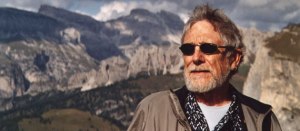In December 1994, I attended a poetry reading at Poets House in New York by two Portuguese poets, Nuno Júdice and Pedro Tamen, along with the translator, Richard Zenith. Little did I know that this event would have an impact on the profound journey into my ancestral roots in Portugal and the Azores.
After my Portuguese grandfather passed away in September 1993, I was at a loss to uncover our family’s history, which he had been reluctant to share. Hearing Júdice and Tamen read their poems in Portuguese the following December was a revelation of sorts—here were real, live Portuguese poets speaking the language of my ancestors.
The dearth of first-hand accounts and available source materials kept me from learning my family’s Portuguese Azorean history for many years and, frankly, life got in the way of digging deeper. When my father died in 2016, I realized that all my family’s histories were available to me, except one part—the Portuguese. By then, Ancestry.com had made many research materials available online for the first time, and a group of Azorean Genealogists gathered on a listserv to share information, leads, and help translate documents from the Azores, much of which had also become available online in the form of scanned records from the parish archives from the Azores. Suddenly, my research got easier.
In 2018, I made my first trip to the Azores and Portugal, and before going, I reached out to Nuno Júdice, whose contact information I had kept from that poetry reading decades ago.
To my surprise, Nuno remembered me, and we arranged to meet during my visit to Lisbon in July of that year. We spent a delightful evening together, with Nuno sharing insights into Portuguese poetry, history, and culture. Our connection deepened further when he invited me to write a foreword for David Swartz’s English translation of his novella, The Religious Mantle, and later, he published several of my poems in a literary journal he edited.

In 2020, Nuno graciously provided a blurb for my book Azorean Suite/Suite Açoriana, celebrating the work as a poetic exploration of ancestral memory and the experiences of Portuguese emigrants.
Our paths continued to intertwine as the translator Margarida Vale de Gato, whom Nuno had earlier recommended for my poems, agreed to translate my book Dwelling: an ecopoem into Portuguese. Nuno even agreed to help launch the translated edition, Habitar: um ecopoema, in Lisbon in September 2022. In many ways, this felt like coming full circle from our initial encounter at that poetry reading nearly three decades ago.
In a serendipitous twist, Júdice revealed that he had met one of my teachers, the renowned poet Gary Snyder, whom Margarida had also translated, in Madrid in the 1980s. He even shared a draft of a poem he had written about that encounter, further solidifying the interconnectedness of our poetic journeys. When Nuno Júdice passed away last month unexpectedly, I was deeply sad to hear the news from David Swartz; I had just been thinking about Nuno and had planned to write to him. He would have turned 75 years old later this month.
Here is Nuno Júdice’s poem, “Madrid, Anos 80” and my translation from the Portuguese:
MADRID, ANOS 80
Cruzei-me uma vez com Gary Snyder nas Bellas Artes
de Madrid. Eu vinha com livros espanhóis – poesia, e algum
Borges, onde há sempre coisas novas – e cruzei-me com Gary
Snyder, que vinha de ler poemas, mas quando o soube já
a leitura tinha acabado. Também não sei se o iria ouvir: não é
todos os dias que se está em Madrid, com tempo para ir
às livrarias e espreitar museus; e ouvir Gary Snyder pode
não dar jeito ou, pelo menos, obrigar a que se perca alguma coisa
que tão cedo não se voltará a ver. Foi assim que, antes de ir à livraria,
eu tinha passado pelo Caspar David Friedrich, no Prado,
perseguindo montanhas e ruínas da velha Alemanha. Ao sair dali,
com os olhos enevoados pelo mar do Norte, como iria
entrar numa sala para ouvir Gary Snyder? Da próxima vez
que estiver em Madrid, porém, não vai ser assim: e se me cruzar,
nas Bellas Artes, com um poeta que acabe de ler poemas,
mesmo que eu venha da livraria, e tenha passado pelo Prado,
vou arranjar tempo para o ouvir – em homenagem a
Gary Snyder, que não tive tempo
para ouvir.
Nuno Júdice, 26-11-2000
__
MADRID, 80’s
I crossed paths with Gary Snyder once, at Bellas Artes
in Madrid. I was carrying Spanish books – poetry, and some
Borges, where there are always new things – and I bumped into Gary
Snyder, who came to read poems, but by the time I found out
the reading was over. I didn’t know if I would listen to him either: it isn’t
every day that you’re in Madrid, with time to go
to bookstores and look around museums; and listening to Gary Snyder might
not be useful or, at least, make you miss something
that you won’t see again anytime soon. So, before going to the bookstore,
I had passed by Caspar David Friedrich, in the Prado,
chasing mountains and ruins of old Germany. As I left,
with eyes clouded by the North Sea, how was I going to
walk into a room to listen to Gary Snyder? The next time
when I’m in Madrid, however, it won’t be like that: and if you bump into me,
in Bellas Artes, with a poet who has just finished reading poems,
even if I’m coming from the bookstore, and have just passed through the Prado,
I will make time to listen – in honor of
Gary Snyder, who I didn’t have time
to hear.
Translated from the Portuguese by Scott Edward Anderson


The author’s copy of Riprap & Cold Mountain Poems by Gary Snyder.
Schuykill Valley Journal Online published my essay on Gary Snyder’s “Mid-August at Sourdough Mountain Lookout” last month. Here are the introductory paragraphs and a link to the full essay:
To get to Sourdough Mountain Lookout, you hike a good five miles, gaining 5000 feet or more of elevation. The terrain is rugged and the hiking strenuous, but that’s to be expected in the Northern Cascades. Located 130 miles northeast of Seattle, Washington, the Forest Service opened one of its first lookouts here in 1915.
The view from the lookout station, constructed by the Civilian Conservation Corps in 1933, is a postcard in every direction: Hozomeen Mountain and Desolation Peak looking north, Jack and Crater mountains out east, Pyramid and Colonial peaks to the south with Ross and Diablo lakes directly below, and, as if not to be outdone, the Picket Range is off to the west. This is impressive country and you can understand why it’s been an inspiration to poets and writers for generations.
Poet Gary Snyder was 23 when he worked as a fire-spotter on Sourdough Mountain in 1953.
 Today is poet Gary Snyder’s birthday. He is 83 years old.
Today is poet Gary Snyder’s birthday. He is 83 years old.
I studied with Gary and he had a big impact on my poetry, which I’ve written about elsewhere on this blog.
You won’t find traces of his influence in my work, stylistically at any rate; rather you’ll find it in my deep engagement of nature, in how I pay attention, and “be crafty and get the work done.”
Happy birthday Gary!
Here is Gary Snyder’s poem, “Old Bones”:
Old Bones
Out there walking round, looking out for food,
a rootstock, a birdcall, a seed that you can crack
plucking, digging, snaring, snagging,
barely getting by,
no food out there on dusty slopes of scree—
carry some—look for some,
go for a hungry dream.
Deer bone, Dall sheep,
bones hunger home.
Out there somewhere
a shrine for the old ones,
the dust of the old bones,
old songs and tales.
What we ate—who ate what—
how we all prevailed.
–Gary Snyder
And here is a recording of Gary reading “Old Bones”:
Magpies, Alaska, and my poem “Naming”
July 9, 2010
Almost a decade ago, the Alaska Quarterly Review published a poem of mine called “Naming.” I thought of it today because a good friend mentioned it in a message to me on Twitter. (She had overheard a conversation about magpies I was having with another friend.)
I’m not around magpies much these days, living on the East Coast. I miss them. Magpies, all corvids, really, are a totem for me (bears, especially polar bears are my other totem). Highly intelligent birds with bad reputations, they are a lot of fun.
Gary Snyder once told me and a group of other students that we should find totems for our poetry, “this is the world of nature, myth, archetype, and ecosystem that we must all investigate.” He also told us to “fear not science,” to know what’s what in the ecosystem, to study mind and language, and that our work should be grounded in place. Most of all, he instructed, “be crafty and get the work done.”
Advice that also, curiously enough, reminds me of magpies.
Here is my poem “Naming”:
The way a name lingers in the snow
when traced by hand.
The way angels are made in snow,
all body down,
arms moving from side to ear to side to ear—
a whisper, a pause;
the slight, melting hesitation–
The pause in the hand as it moves
over a name carved in black granite.
The “Chuck, Chuck, Chuck,”
of great-tailed grackles
at southern coastal marshes,
or the way magpies repeat,
“Meg, Meg, Meg”–
The way the rib cage of a whale
resembles the architecture of I. M. Pei.
The way two names on a page
separated by thousands of lines,
pages, bookshelves, miles, can be connected.
The way wind hums through cord grass;
rain on bluestem, on mesquite–
The tremble in the sandpiper
as it skitters over tidal mudflats,
tracking names in the wet silt,
silt that has been building
since Foreman lost to Ali,
since Troy fell — building until
we forget names altogether–
The way children, who know only
syllables endlessly repeated,
connect one moment to the next by
humming, humming, humming–
The way magpies connect branches
into thickets for their nesting–
The curve of thumb as it caresses
the letters in the name of a loved one
on the printed page, connecting
each letter with a trace of oil
from fingerprint to fingerprint,
again and again and again—
Scott Edward Anderson
Alaska Quarterly Review, Summer 2001
Here is an Mp3 recording of me reading “Naming” Live at the Writers House, University of Pennsylvania, on September 22, 2008: Scott Edward Anderson’s “Naming” (Note: there is a 10-second delay at the beginning of the file.)
Postscript: And here is a filmpoem of “Naming” made by Alastair Cook in 2011: Naming
5 Books of Contemporary Poetry I Can’t Live Without
March 23, 2010
Thanks to Peter Semmelhack, who asked for poetry recommendations via Twitter, I made a list of the 5 books of “contemporary” US poetry I can’t live without:
Elizabeth Bishop, Geography III


![Reblog this post [with Zemanta]](https://i0.wp.com/img.zemanta.com/reblog_e.png)